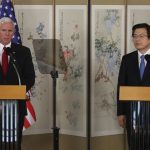A knife darting out in a packed subway car. An assailant, chasing shoppers, stabbing wildly in the street.
These nightmares have played out in the minds of many South Koreans following a mass stabbing attack last week – the country’s second in as many weeks.
On 21 July, a man attacked commuters in the capital, killing one person and stabbing three more at a subway station. He later told police he lived a miserable life and “wanted to make others miserable too”.
Then, on 3 August, 14 people were injured in Seongnam, south-east of Seoul, when a man rammed his car into pedestrians near a subway stop, and then ran into a department store, where he stabbed nine people. One woman died later from her injuries.
The second attacker, Choi Won-jong, 22, was a delivery driver and high-school dropout who had been diagnosed with schizoid personality disorder.
Police said he had googled news about the first attack before his own rampage.
In South Korea, they are known as “Don’t Ask Why” or Mudjima crimes – inexplicable acts of violence targeting strangers, driven by no personal link to victims or obvious motive.
Choi Won-jong, a 22-year-old man under arrest for a stabbing rampage, is escorted out of a police station in Seongnam, South Korea on 10/08/2023 as he is sent to prosecutors on charges of murder and attempted murder.
Choi Won-jong is facing murder and attempted murder charges for the stabbing rampage in Seongnam, south-east of Seoul.
While they’ve been called Mudjima by the public for years, it was only in 2022 that South Korean police officially designated such crimes as a distinct category: “Abnormal Motive Crimes”.
With specific definitions and a task force set up to combat them, the move appeared to show authorities finally taking the crimes seriously. In the first half of this year, police recorded 18 Mudjima acts.
While overall data shows no rise in violent crime – South Korea last year in fact recorded its lowest rates in a decade – the recent stabbings have driven the perception that Mudjima acts are more common, and society more dangerous.
It has even led to some commentators making comparisons with the US, with online remarks: “It’s the American mentality that’s going viral in South Korea” and “OMG South Korea has become the USA of Asia”.













